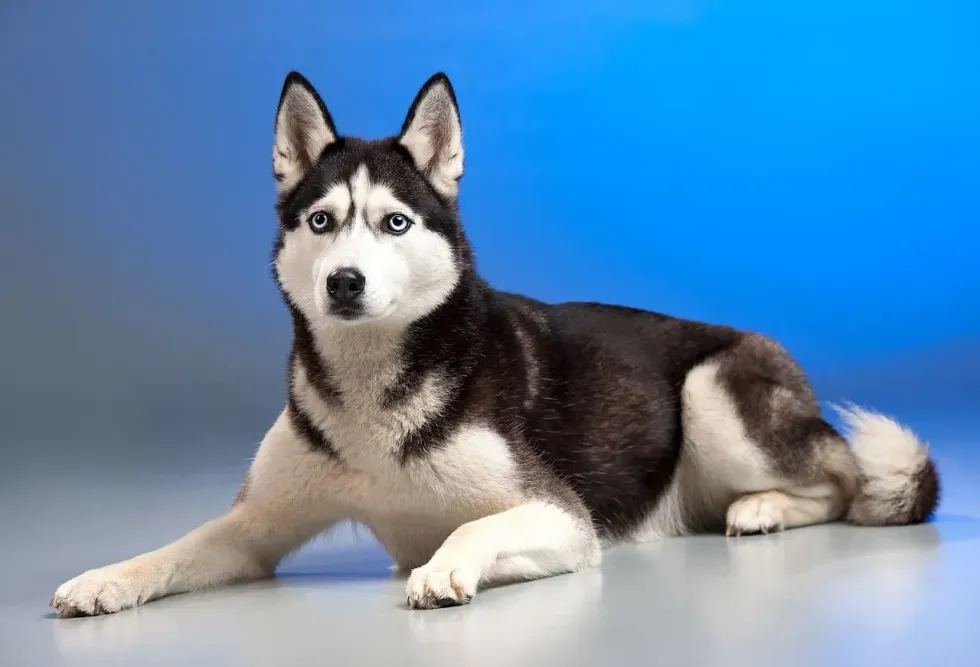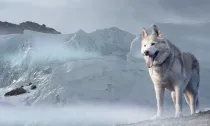Fun Huskita Facts For Kids

For time immemorial, breeds of dogs resulting from the mixing of two breeds have been a source of joy for all dog lovers. Some mixed breeds turn out to be extremely amiable while some can be big, bad, and mean.
Huskita is a classic example of a loving and friendly dog. It is the result of the reproduction of a Siberian Husky and an Akita.
The Huskita is also, sometimes, referred to as the Siberian Akita. An interesting fact about the Huskita is that despite having been around for a long time, this dog breed is not yet an internationally recognized breed by many organizations.
Keep reading to find out about this adorable mixed breed. After reading about Huskita puppies, you may also want to check out these Alaskan husky facts and Akita Inu facts.
Huskita Interesting Facts
What type of animal is a Huskita?
A Huskita is a dog that is the result of reproduction between a Siberian Husky and an Akita Inu parent breed. The Huskita hybrid dog is an extremely popular breed amongst dog parents across the world.
What class of animal does a Huskita belong to?
A Huskita, being a dog breed, essentially belongs to the classification of Mammalia because it has fur on its skin and a vertebral column, and they give birth to produce offspring. The scientific name for the Huskita is the same as their parent breed, Canis lupus familiaris.
How many Huskita are there in the world?
Owing to the reason that the Huskita is not a recognized breed by organizations such as the American Kennel Club and the like of it, enough data has not been collected or collated regarding the huskita’s population all over the world.
However, this hybrid dog is a fairly popular dog breed like its parent dog breeds Siberian Husky and Akita Inu.
They can be found living in an apartment as well as in a house with a yard.
Where does a Huskita live?
A Huskita lives in a house or a farm since the Huskita is a domesticated breed of dog and lives with human beings as their pets. Despite their excellent prey drive and high energy levels, the trainability of these dogs is not very difficult.
First-time owners require professional knowledge and regular efforts to manage the temperament of Huskitas. High-quality dog food and regular grooming holds the key to their health.
What is a huskita's habitat?
A huskita’s habitat is the same as a human being’s since they live as pets with their owner. Generally, they prefer living in homes that have plenty of space for them to be able to run around and tire themselves out.
These mix breed dogs can, however, be maintained well even in urban, suburban, or apartment homes as long as their owners can ensure they are subjected to plenty of exercise.
Who does Huskita live with?
Huskitas live with their human being owners or families, sometimes with other pets which their human family may have. They require regular grooming and exercise when they live with their human family.
How long does a Huskita live?
A huskita’s average life expectancy is around 10-13 years of age. The life span of these mixed breed dogs with medium energy levels can be improved slightly by taking care of their exercise needs and standard health issues.
Feeding good quality dog food is extremely useful in addressing their health issues. Moreover, proper training, regular exercise, and grooming also help in increasing their life span.
How do they reproduce?
The Huskita breed of dog follows the same pattern and behavior for reproduction that all dogs do.
Typically, to show an interest in a female for reproduction, the male will approach the female’s private parts and smell them.
If at all the female wishes to proceed, she will cooperate and move her tail to one side as a concrete communication of her mutual desire to reproduce.
If, however, the female does not wish to reproduce with that male, she will either deny any further opportunity to the male by either sitting down or turning aggressive toward the male.
If the female is fertilized after intercourse with the male, she will be pregnant for about two months following which she will give birth to 4-6 puppies.
What is their conservation status?
The Huskita is not listed by any organization concerning its conservation status since it is not a recognized breed of dog in most countries and ultimately, the Huskita breed’s conservation status depends on the demand for it in the pet dog market.
Their friendliness makes them ideal companions for any owner, hence ensuring that these active dogs are always living in a loving home.
Huskita Fun Facts
What does Huskita look like?
The Huskita breed of dog is a medium-sized dog that’s almost as large or a little larger than the Akita and Siberian Husky.
These low-shedding dogs essentially have upright and attentive ears and a snout like the Siberian Husky, slightly elongated with a rounded tip which is where the nose is situated.
Their skulls are generally flat-topped and these loyal dogs have an appropriately proportioned to the rest of their body, and neck.
The bodies of healthy Huskitas are generally lean and covered with a thick and medium-sized length of fur which is usually colored in shades of white, grey, and faded black, and often have patches of contrasting color all over the body.
Their legs are strong and muscular since the Huskita is essentially the result of procreation by two top-grade working-class dog breeds.

*Please note this is an image of a husky, not a Huskita. If you have an image of a Huskita, let us know at hello@kidadl.com.
How cute are they?
Huskita is an extremely cute breed of dog that will be more than happy to oblige you by letting you pet it. Usually, Huskita puppies are also of a warm and affectionate nature that comes with a playful personality which makes them ever-ready to meet new friends and people.
The friendliness and loving temperament of these low-shedding dogs make them extremely protective and loyal to their owners. With proper training, exercise, and grooming, these loyal dogs make for loving companions for any family with kids.
How do they communicate?
Huskita, being an extremely active breed of dog, usually barks energetically to communicate any emotion that it feels. Like most other dogs, the Huskita breed of dog will growl to warn its family or prepare itself for any danger or threat.
It will wag its tail to show that it is happy or exciting and like every other dog, it will lick you to show affection.
Ultimately, every dog has idiosyncrasies that every owner will have to figure out for themselves. However, all in all, the Huskita communicates by using generic ways of communication performed by dogs.
How big is a Huskita?
The Huskita measures about 22-26 in up to its shoulders which makes it the same size as a healthy German Shepherd dog.
How fast can a Huskita run?
Huskita is a result of procreation between two apex working-class dogs, both of which have high levels of energy, stamina, and endurance. Even though there is no documented top speed that is achievable by the Huskita, a rough estimate of 30 mph (48 kph) is extremely plausible for this breed of dog with high energy levels.
Though the trainability factor for them is not exactly easy, with regular exercise, grooming, and training, their running speeds can be improved along with their energy levels.
How much does a Huskita weigh?
The average Huskita weighs about 70 lb-120 lb (31-54 kg). However, close attention must be given and paid to a huskita’s weight since these designer dogs tend to put on unhealthy amounts of weight, especially when these loyal dogs don’t get the desired amount of physical exertion in their routine.
As these moderate-shedding dogs have high energy levels, their food intake tends to be equally high. Hence, regular exercise and training are essential for these mixed-breed dogs for weight management.
What are the male and female names of the species?
Since a Huskita is ultimately a breed of dog, males are referred to as dogs whereas their female counterparts are called bitches.
What would you call a baby Huskita?
A baby Huskita would be known as a Huskita puppy.
What do they eat?
A huskita’s ideal diet should be at least 17-20% protein to remain healthy. Therefore, having a diet rich in chicken, mutton, beef, eggs, fish and other sources of protein is advisable.
In addition to natural meat and vegetables, a Huskita can also be fed commercially available packaged dry kibble and the likes of such foods. Along with a healthy diet, regular exercise and grooming must be provided by the owners.
Are they slobbery?
No, a Huskita is not a slobbery dog under normal circumstances. Unless the dog is ill or is extremely tired and thirsty, a Huskita will have minimal slobber and drool falling out of its mouth.
Would they make a good pet?
Yes, a Huskita would make for an excellent pet provided that its owner can guarantee plenty of physical exertion in its daily routine and plenty of space for it to run around and enjoy itself.
The Huskita has a tendency to become a noisy dog and irritable and cranky when its physical needs are not met, which is why it is ideal to have the Huskita as a pet for people who live in sprawling bungalows or villas.
The huskita’s temperament is full of friendliness and affection and it can adjust to family very easily.
It is also child-friendly and will protect your children with its life if need be.
This breed of dog is extremely intuitive and caring in nature and is an extremely loyal breed of dog. The Huskita does, however, require regular grooming to avoid matted hair and heavy hair fall.
Did you know...
The most common health problems that plague this breed are epilepsy, blood diseases, and hip dysplasia.
The Huskita began to be intentionally bred in the last decade of the 20th century.
How big does a Huskita get?
The average Huskita weighs about 70-120 lb (31-54 kg). However, close attention must be paid to a huskita’s weight since these designer dogs tend to put on unhealthy amounts of weight, especially when these animals don’t get the desired amount of physical exertion in their routine.
These mixed breed dogs are medium to large-sized dogs with a maximum height of roughly 26 in (66 cm) in height up to their shoulders.
Are Huskita guard dogs?
Yes, Huskitas can make for excellent guard dogs since their natural temperament is that of being alert and protective as well as active.
Huskitas, are friendly instinct dogs and love to be petted by a new friend, have been known to be extremely protective of their families and homes especially when dealing with any dangerous factor or person.
The Huskita can be as good as the German Shepherd breed of dog when it comes to protecting its home and family.
Adding to that, the fact that the genes of this breed are a cocktail of two splendid working-class breeds, this dog is also very strong and very fast which gives it an added edge concerning guarding their homes and families.
Here at Kidadl, we have carefully created lots of interesting family-friendly animal facts for everyone to discover! For more relatable content, check out these banded palm civet facts or ringtail cat facts.
You can even occupy yourself at home by drawing one on our Huskita coloring pages.
We Want Your Photos!
More for You
See All
Doctorate specializing in Veterinary Medicine

Oluniyi AkandeDoctorate specializing in Veterinary Medicine
With an accomplished background as a Veterinarian, SEO content writer, and public speaker, Oluniyi brings a wealth of skills and experience to his work. Holding a Doctor of Veterinary Medicine degree from the University of Ibadan, he provides exceptional consulting services to pet owners, animal farms, and agricultural establishments. Oluniyi's impressive writing career spans over five years, during which he has produced over 5000 high-quality short- and long-form pieces of content. His versatility shines through as he tackles a diverse array of topics, including pets, real estate, sports, games, technology, landscaping, healthcare, cosmetics, personal loans, debt management, construction, and agriculture.
Bachelor of Journalism and Mass Communication

Ankit ShindeBachelor of Journalism and Mass Communication
Ankit is a Journalism and Mass Media graduate from the University of Mumbai. With experience in SEO, blog and article writing, and fiction writing, he is a versatile writer and content creator. In his free time, Ankit enjoys reading, writing, and listening to music.
Disclaimer
1) Kidadl is independent and to make our service free to you the reader we are supported by advertising. We hope you love our recommendations for products and services! What we suggest is selected independently by the Kidadl team. If you purchase using the Buy Now button we may earn a small commission. This does not influence our choices. Prices are correct and items are available at the time the article was published but we cannot guarantee that on the time of reading. Please note that Kidadl is a participant in the Amazon Services LLC Associates Program, an affiliate advertising program designed to provide a means for sites to earn advertising fees by advertising and linking to Amazon. We also link to other websites, but are not responsible for their content.
2) At Kidadl, we strive to recommend the very best activities and events. We will always aim to give you accurate information at the date of publication - however, information does change, so it’s important you do your own research, double-check and make the decision that is right for your family. We recognise that not all activities and ideas are appropriate for all children and families or in all circumstances. Our recommended activities are based on age but these are a guide. We recommend that these ideas are used as inspiration, that ideas are undertaken with appropriate adult supervision, and that each adult uses their own discretion and knowledge of their children to consider the safety and suitability. Kidadl cannot accept liability for the execution of these ideas, and parental supervision is advised at all times, as safety is paramount. Anyone using the information provided by Kidadl does so at their own risk and we can not accept liability if things go wrong.
3) Because we are an educational resource, we have quotes and facts about a range of historical and modern figures. We do not endorse the actions of or rhetoric of all the people included in these collections, but we think they are important for growing minds to learn about under the guidance of parents or guardians.







